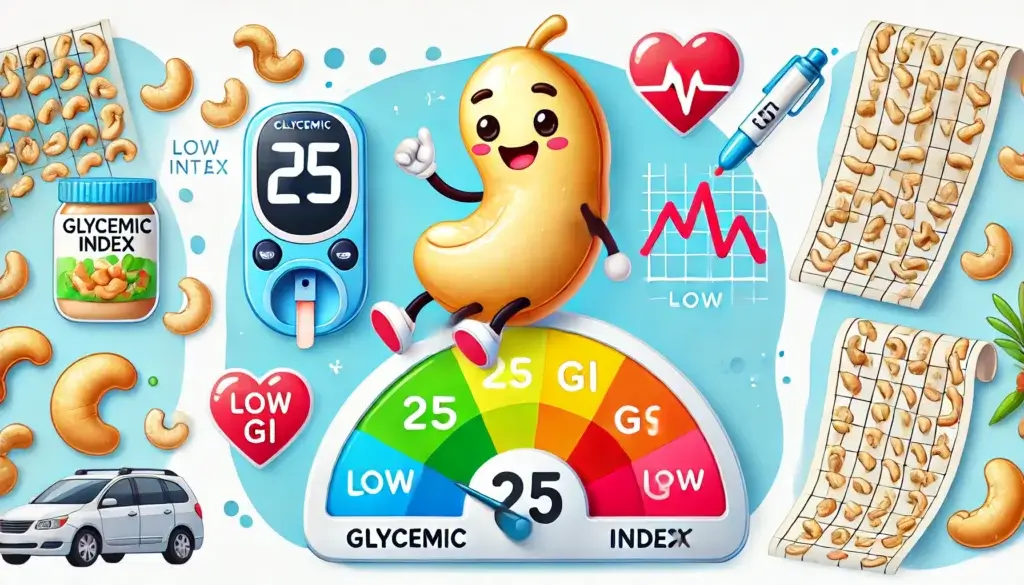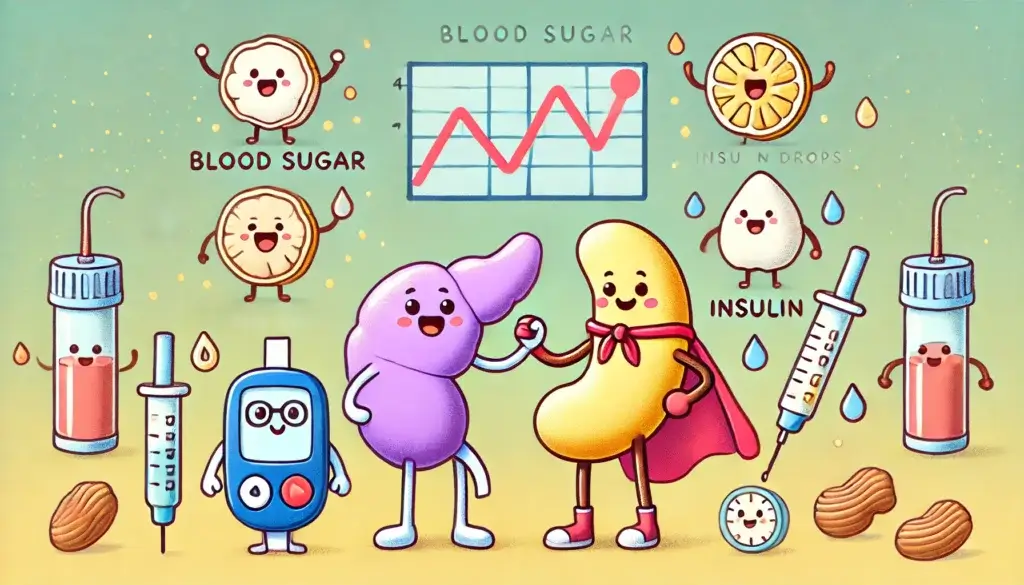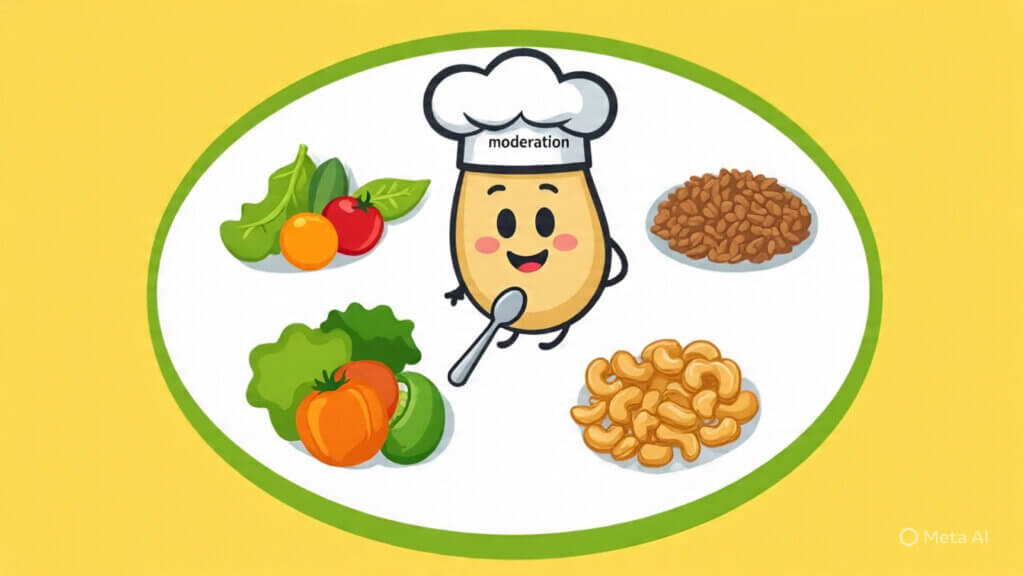Have you ever wondered how the cashew glycemic index affects blood sugar and whether it can actually help people with diabetes? The good news is that cashews have a low glycemic index (GI), which makes them a smart snack choice when eaten in the right amount. In this post, we’ll explore what GI means, why cashews are considered low-GI, how they help manage diabetes, and practical tips for including them in your daily life. By the end, you’ll know exactly how to make the most of the low GI cashew benefits for diabetes without any confusion.
What is Glycemic Index and Where Do Cashews Stand?
The glycemic index (GI) is a scientific scale used to measure how quickly a food raises your blood sugar after eating. Foods are rated on a scale of 0–100. Low-GI foods (55 or below) are digested and absorbed more slowly, leading to gradual increases in blood sugar rather than sharp spikes. This makes them particularly beneficial for people with diabetes or insulin resistance.
The cashew glycemic index is around 25, which places it firmly in the low-GI category. This means when you eat cashews in moderate amounts, they release glucose slowly into your bloodstream. Unlike high-GI foods like white bread or sugary snacks, cashews help maintain steady blood sugar levels. This stability is crucial for diabetes management because large spikes and drops in blood sugar can lead to fatigue, cravings, and long-term complications.
Why are cashews low GI? It’s due to their nutrient profile. Cashews are rich in healthy fats, plant-based protein, and fiber. All these nutrients slow down digestion and the release of sugar into the bloodstream. They also have a relatively small amount of natural sugar and carbohydrates compared to other snack foods.

Understanding the cashew glycemic index is the first step in using cashews wisely. Low-GI eating is not about avoiding all carbs but about choosing carbs that won’t disrupt your blood sugar. Cashews fit perfectly into this strategy.
Cashews and Blood Sugar Control: The Science Behind It
Managing diabetes isn’t only about medication; diet plays a big role. Research on nuts, including cashews, shows promising benefits for people with type 2 diabetes. Cashews have been linked with improved insulin sensitivity and better lipid (cholesterol) profiles.
How does the cashew glycemic index contribute to blood sugar control? Because of its low GI, eating cashews causes only a slow and small rise in blood glucose. This reduces stress on the pancreas, which is responsible for producing insulin. Insulin helps move sugar out of the bloodstream and into cells where it can be used for energy. If you constantly consume high-GI foods, your pancreas has to work overtime, which can lead to insulin resistance over time. Cashews, being low GI, help avoid this.
Cashews are also a source of magnesium, an essential mineral that helps regulate blood sugar and improves how insulin works in the body. Studies have found that diets higher in magnesium are associated with a lower risk of developing type 2 diabetes.

Moreover, the combination of protein, healthy fats, and fiber in cashews helps you feel full longer, reducing overeating and cravings for sugary foods. Many people find that when they swap out high-carb snacks with cashews, their overall daily calorie intake naturally decreases.
These mechanisms show why the low GI cashew benefits for diabetes go beyond just blood sugar control—they improve the whole metabolic picture. However, moderation is essential, which we’ll discuss later.
How Cashews Fit Into a Diabetes-Friendly Diet
The benefits of cashews don’t exist in isolation. Scientists have studied tree nuts (like almonds, walnuts, and cashews) and found that including them as part of a balanced diet helps with blood sugar control, heart health, and weight management.
One reason the cashew glycemic index is helpful for diabetes is that cashews provide a good alternative to high-carb, high-sugar snacks. When you eat chips or cookies, your blood sugar spikes quickly. When you eat cashews instead, your blood sugar stays stable, which reduces your risk of sudden crashes and cravings.
Cucumber protein per 100g – Science Behind the Crunch
Cashews also contain heart-healthy monounsaturated fats, which have been shown to improve cholesterol levels. Many people with diabetes are at higher risk of heart disease, so improving cholesterol while also controlling blood sugar is a double benefit.
Interestingly, research has shown that diets rich in nuts like cashews can improve markers like fasting insulin and insulin sensitivity even when the effects on fasting glucose or HbA1c (a 3-month average blood sugar marker) are modest. This means cashews may not dramatically lower your blood sugar overnight, but they support long-term blood sugar and metabolic health.

Adding cashews to your diet works best when combined with other whole foods like vegetables, lean proteins, and whole grains. The idea is to create balanced meals that won’t spike your blood sugar. Cashews can be one of the healthy fat and protein sources in that mix.
Practical Tips: How to Include Cashews in Your Meals
Knowing that the cashew glycemic index is low is great, but how can you actually use cashews day to day? Here are some practical and tasty ways:
- Snack Smart: A handful (about 18 cashews or 1 ounce) makes an ideal portion. Pre-portion them in small containers or bags to avoid overeating.
- Add to Salads: Toss roasted or raw cashews into your green salads for a crunchy, satisfying texture.
- Blend into Smoothies: A spoonful of cashew butter can add creaminess and healthy fats to your morning smoothie.
- Stir into Oatmeal or Yogurt: Adds healthy fats, protein, and crunch while keeping your breakfast low GI.
- Use in Stir-Fries: Cashews pair perfectly with vegetables and lean protein like chicken or tofu.
The key is moderation. While the cashew glycemic index is low, cashews are calorie-dense. Eating too many can add up in calories and may lead to weight gain, which can worsen diabetes management. Stick to about 1 ounce a day unless advised otherwise by your healthcare provider.
Another tip is to eat cashews along with other low-GI foods. Combining them with vegetables, whole grains, or lean protein further helps slow down the digestion of carbs and reduces overall glycemic impact.
Limitations and Precautions to Keep in Mind
Cashews are healthy, but they’re not a miracle cure. Even though the cashew glycemic index is low, overconsumption can cause problems. Too many cashews can lead to excessive calorie intake, which might contribute to weight gain. Since weight management is a crucial part of diabetes care, portion control matters.
Some flavored or packaged cashews are coated with sugar, honey, or excessive salt. These added ingredients can increase blood sugar or blood pressure, counteracting the benefits. Always choose plain or lightly roasted cashews without added sugar.
Another point to remember is that while cashews are low GI, their effect on blood sugar can vary among individuals. Factors like your overall meal composition, how active you are, and your personal metabolic response all play a role.
Also, people with nut allergies should obviously avoid cashews. Symptoms can range from mild itching to severe reactions.

Finally, cashews should be part of a holistic diabetes management plan. Relying solely on cashews while ignoring other aspects like exercise, medications, or other dietary needs won’t give you the desired results. Use them as one of many tools to improve your health.
Summary: Why Cashew Glycemic Index Matters
To sum it up, the cashew glycemic index being low makes cashews a smart choice for diabetes management. Their low GI, combined with healthy fats, magnesium, and fiber, helps improve insulin function, manage appetite, and support heart health. When eaten in moderation, cashews provide multiple benefits without spiking your blood sugar.
However, the real key is balance. Cashews work best when they’re part of an overall healthy, low-GI diet and active lifestyle. By making thoughtful choices, you can enjoy cashews guilt-free while supporting your diabetes management goals.
FAQs About Cashews and Diabetes
1. What is the glycemic index of cashews?
Cashews have a glycemic index of about 25, which makes them a low-GI food.
2. Can cashews raise blood sugar?
In moderation, cashews have minimal impact on blood sugar because of their low GI and healthy fat and protein content.
3. Are cashews good for people with diabetes?
Yes, research shows cashews can support blood sugar control and improve cholesterol when consumed in proper portions.
4. How many cashews should a diabetic eat per day?
Around 1 ounce (about 18 cashews) is a healthy serving size for most people with diabetes.
5. Are salted or flavored cashews okay?
It’s best to choose unsalted or lightly roasted plain cashews, as flavored varieties may contain added sugar or excessive salt.
Disclaimer: We are not doctor. if you have any medical condition, please consult with your doctor.
